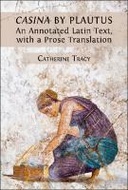Explore
Casina' was written for audiences in ancient Rome, but tells the story of an Athenian man and his son competing for the affections of a young enslaved woman who was brought up in their household. Deception, disguise, and domestic conflict unfold as the old man’s schemes are cleverly thwarted by his wife. Likely one of Plautus’s later works, 'Casina' offers both linguistic challenge and comic brilliance, making it ideal for classroom use or independent study. This edition features the complete Latin text of the play, richly annotated with grammatical and vocabulary notes to support comprehension. A clear prose translation accompanies the original, offering accessible insight into the humor and intrigue of the play. The introduction provides historical and cultural context, situating the farce within ancient Athenian and Roman comedic traditions. This volume is designed for students with intermediate Latin skills who wish to engage directly with Plautus’s lively comic play.
This book is included in DOAB.
Why read this book? Have your say.
You must be logged in to comment.
Rights Information
Are you the author or publisher of this work? If so, you can claim it as yours by registering as an Unglue.it rights holder.Downloads
This work has been downloaded 10 times via unglue.it ebook links.
- 10 - pdf (CC BY-NC-ND) at OAPEN Library.
Keywords
- Latin drama (Comedy)
- Latin language
- Palliata
- Plautus, titus maccius
- Rome (Republic)
- thema EDItEUR::2 Language qualifiers::2A Indo-European languages::2AD Romance, Italic and Rhaeto-Romanic languages::2ADL Latin
- thema EDItEUR::C Language and Linguistics::CJ Language teaching and learning
- thema EDItEUR::D Biography, Literature and Literary studies::DB Ancient, classical and medieval texts::DBS Ancient Sagas and epics::DBSG Ancient Greek and Roman literature
- thema EDItEUR::D Biography, Literature and Literary studies::DS Literature: history and criticism::DSB Literary studies: general::DSBB Literary studies: ancient, classical and medieval
- Women – Rome
Links
DOI: 10.11647/OBP.0482Editions

